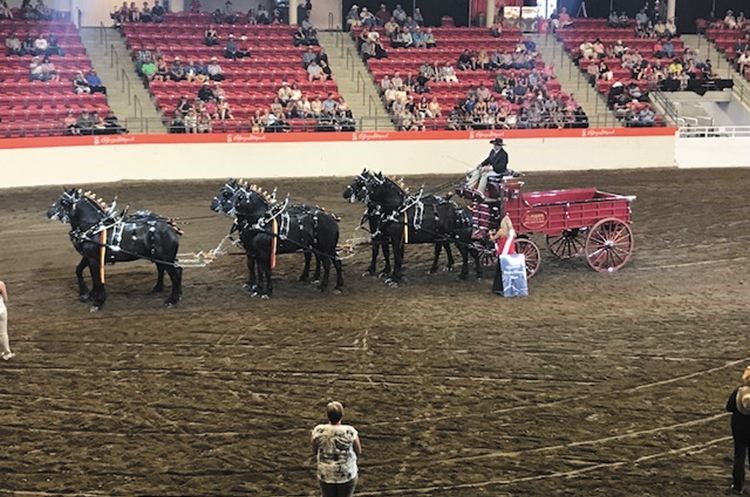A coin flip decided it for Zane Pickering.
He lost and his wife won. So instead of buying more Belgian heavy horses, as Zane wanted, the Prince George couple invested in the Percheron breed Diane liked.
That switch away from Belgians and Clydesdales to Percherons three years ago paid off in a big way last week at the Calgary Stampede heavy horse pull competitions, where the prize performers of Pickering Farms of Prince George were prominent near the top of the standings in several classes.
The Pickering show hitch repeated as Stampede class champions in the Big 6 Percheron breed event, with Mr. Ray stealing the spotlight with first- and second-place results in the supreme grand champion halter class for the second straight year.
"That's where they judge the horse for his size and his proportioning, so ultimately it was the best horse of the show," said Zane Pickering.
"We had a Belgian breed and wanted to get into a more athletic-style of horse to compete at a higher level and the Percherons are. We were going to start the Belgian breed in the heavy horse pulls but Diane liked the blacks so we went to Percherons. We've covered all three draft horse breeds and we enjoy them."
The Pickering-owned teams of Percherons also won the team class event, the unicorn class, ladies cart class and posted third- and fourth-place results in the youth cart class.
But the best was yet to come on Monday and Tuesday in the all-breeds world championship six event, where Pickering's horses pulled their way to a second-place finish. As Percheron class champions at the Stampede, they hauled in $10,000 prize.
"Everything helps, it's a very expensive hobby and endeavour to get there, it probably cost us $300,000 a year," said Zane Pickering. "They're a young bunch and part of the satisfaction is victory and seeing your horses develop and move along in the grand scheme of things. That's been our fifth year in a row showing there and this year was probably our best year of all. We were able to maintain what we did last year and ultimately better it."
Pickering, who owns Falcon Contracting in Prince George, had eight horses competing in Calgary. They were trained in Viking, Alta., by Gord Ruzukia, who worked the teams several hours per day to get them strong enough for the competitions. The Stampede event has been expanded from four to seven days and is recognized as the largest, most prestigious heavy horse event in Canada.
The heavy horse competition involves teams of two horses dragging a steel stone-boat weighed down with cement blocks. If none of the teams can reach the required 14 feet, the winner is whichever team can pull the weight furthest. Depending on the type of ground, the horse teams of six can pull as much as 11,000 pounds. They are also judged on their overall appearance.
Draft horses were the working animals of Canadian farms in the early decades of the 1900s. The heavy horse breeds - Cydesdales, Shires, Belgians and Percherons - were essential to grain farmers for their ability to move heavy loads and plough fields. In the years before tractors with internal combustion engines and other motorized farm implements became mainstream, most farms needed a stable of at least 10 heavy horses to work the fields.
The heavy horse pull started out as a way for farmers to settle bets as to who had the strongest team and it grew to become a staple competition at fairs like the B.C. Northern Exhibition in Prince George, Falkland Stampede, Royal Manitoba Winter Fair and Calgary Stampede. Now that the season is winding down, Pickering plans to move his horses from Alberta and bring them home to his Pineview property.



